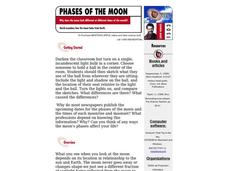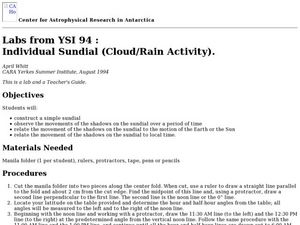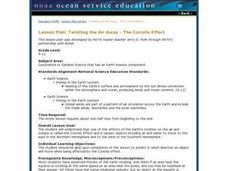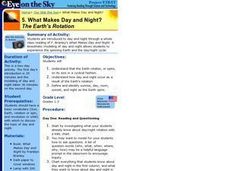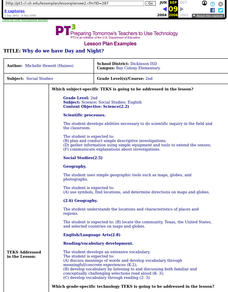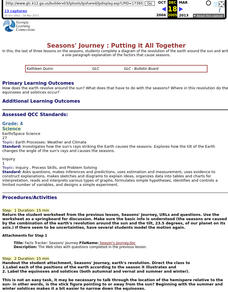Curated OER
Phases of the Moon
Young scholars explore why when you examine the moon depends on its location in relationship to the sun and Earth. The moon never goes away or changes shape-we just see a different fraction of sunlight being reflected from the moon to...
Curated OER
Circular Motion
Students research physical science by completing worksheets. In this gravity lesson, students read assigned text regarding the rotation of Earth and the gravitational force caused by the speed of which it rotates. Students complete a...
Curated OER
Earth Turns? Prove It!
Students construct a pendulum using a washer and thin fishing line. In this earth science activity, students simulate Earth's rotation using the pendulum bob and swivel chair. They explain how this activity proves that the Earth is...
Curated OER
Building and a sundial
Young scholars create a sundial. For this sundial lesson, students examine the history and use of sundials. Young scholars create a sundial and test their sundial.
Curated OER
Individual Sundial (Cloud/Rain Activity)
Students make a simple sundial to examine the changes in shadows over time. In this sundial and shadow instructional activity, students make a simple sundial out of a manila folder and pencil. They observe how shadows change over time,...
Curated OER
Twisting the Air Away - The Coriolis Effect
Students examine the Coriolis Effect and its effects on the different hemispheres. For this Earth science lesson students divide into groups to they make predictions. Students then complete an activity to explore movement as it relates...
Curated OER
The Earth's Rotation
Young scholars see a model of a globe to watch the Earth rotate. In this Earth lesson plan, students rotate the globe and shine a flashlight to see where the sun shines and how it rises and sets. They create a diagram and explain day and...
Curated OER
Moon Shadows
For this moon shadows worksheet, 3rd graders follow the directions to set up a demonstration about the sun, the earth and the moon.
Curated OER
Earth's Tilt Creates Seasons
Learners examine how the Earth's tilt creates the seasons. In this seasons lesson plan, students study a diagram that shows the rotation of the earth around the sun and how it tilts during the rotation. They answer 4 discussion questions...
Curated OER
Earth And Its Moon
In this earth and moon worksheet, students read 4 different statements about the placement of the earth and moon during different times. Students write in the effect of each of these statements. This worksheet is a graphic organizer.
Curated OER
What Causes Day and Night?
In this day and night instructional activity, students will that day and night are caused by the Earth's rotation on its axis and that the sun shines on different parts of the Earth. This instructional activity has 4 fill in the blank...
Curated OER
Day and Night
Fifth graders investigate the Earth's rotation and revolution and the moon's orbit around the Earth. They participate in a class discussion about how night and day occur, and take notes. Next, they watch a video about the solar system...
Curated OER
Warming the Earth
First graders investigate how the sun warms the Earth and examine the rotation of the Earth and the sun. They create an illustration of the sun, examine a solar system model, and listen to the book "The Sun: Our Nearest Star." They also...
Curated OER
What Makes Day and Night? The Earth's Rotation
Students discover that the Earth rotates on its axis in a cyclical fashion. They examine how this rotation results in day and night.
Curated OER
Why Do We Have Day And Night?
Second graders demonstrate knowledge and appropriate use of hardware components, software programs, and their connections. After a lecture/demo, student groups utilize raisins and apples to demonstrate day and night. They put togethre a...
Curated OER
Mississippi’s Contribution to Space Exploration
Eighth graders engage in a class discussion while going through a PowerPoint on Mississippi's contribution to space exploration. In this Space science lesson plan, the students will also participate in Brain Pop quizzes where they will...
Curated OER
Why Does the Moon Have Phases?
In this moon worksheet, students complete the sequence of the different phases of the moon to determine why the moon has phases. This worksheet is a graphic organizer.
Curated OER
How Do Eclipses Occur?
In this eclipses worksheet, students write in the 4 steps explaining how an eclipse occurs. This worksheet is a graphic organizer.
Curated OER
How Does the Sun Affect the Earth?
In this sun worksheet, students brainstorm the different ways the sun affects the Earth. This worksheet is a graphic organizer.
Curated OER
Seasons' Journey : Putting it All Together
Third graders complete a diagram of the revolution of the earth around the sun and write a one paragraph explanation of the factors that cause seasons.


